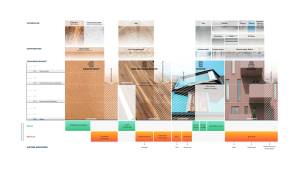The Bauen für Morgen training program is part of the City Loops project aiming to provide professional training programs across Europe to support knowledge sharing and collaboration on the circular economy. In Berlin, our team has focused on the challenges and needs of the construction sector. Bauen für Morgen is a training program for architects, construction companies, material and project developers, and municipalities tackling climate-related construction issues, through the topic of circularity.
FUNDER
EIT Climate-KIC
PROJECT PARTNERS
Provadis Hochschule (Germany), Wuppertal Institute (Germany), CleanTech Bulgaria (Bulgaria), Edinburgh Centre for Carbon Innovation (United Kingdom)
DATE
October 2019 – December 2020
The challenge
Construction is one of the most resource intensive and wasteful sectors. In Berlin, construction and demolition waste is responsible for 61% of total waste (about 4.4 million tons in 2016), and its impact will only grow by 2030. All life-cycle stages of buildings, from construction to end-of-life, cause a significant environmental impact related to energy consumption, waste generation and direct and indirect greenhouse gas emissions. Limited knowledge access, a lack of communication, and the absence of a common understanding and theoretical framework for circular construction create significant challenges for shifting the industry towards circularity.
Our approach
Through a series of workshops, the Bauen für Morgen training provides extensive knowledge on the topic of circular construction–its methods and know-how–to raise the market’s awareness of and demand for circular construction. Using a systemic, multi-disciplinary approach, we tackle this issue from all levels: from material to product; from building to city.
The learning journey is focused on engaging formats of work: interactive group exercises and tools, industry insights and case studies from the experts.
The outcome
During the project, we developed an engaging learning environment and created knowledge relevant for a circular economy transition in construction:
- Created outstanding curriculum for construction professionals with digital formats and physical trainings aimed at promoting collaboration and knowledge sharing between participants
- Tested and applied key circular economy tools such as the circularity compass, structural waste analysis, and value hill
- Develop visual understanding of material flows of specific construction components / elements.
- Created an action plan for Berlin to share with policy- and decision-makers with the participants to accelerate the transition to circularity in construction.
Continue reading
CE strategies in construction projects: learnings from new construction and building redesigns
Learning from spaces or how spaces can underpin circular construction
Circular economy in Berlin’s construction – next level






















